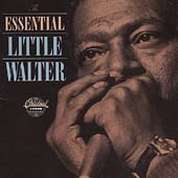 Possibly better than any other blues harmonica player from the post-war era, Marion Walter Jacobs understood the importance of amplification. While research shows there were others who were making use of the possibilities before he entered the picture, there have been very few to match Walter's utter brilliance in the recording studio since. Understanding that increased volume was a necessity in the loud, hustling joints and taverns of Chicago, his investments in microphones and amplifiers paid huge dividends to him and the Chess brothers as numerous titles from Walter's catalog shot into the charts and held lofty positions that sometimes overlapped one another. From the blues side of the Chess roster, Walter held second position behind Muddy as the label's top money generator. Taking his equipment into the studio allowed Walter to push the boundaries of creativity far beyond where they had gone before, and it was Jacobs who took the small harmonica to the peak of its powers. His knowledge of microphones and amps set him apart from the competition, and he did have plenty of that when "Juke" came out in 1952, but his freewheeling spirit and focused determination to emulate the sounds of Louis Jordan and other popular jump saxophone players placed him on a completely different level, well beyond his contemporaries.
Possibly better than any other blues harmonica player from the post-war era, Marion Walter Jacobs understood the importance of amplification. While research shows there were others who were making use of the possibilities before he entered the picture, there have been very few to match Walter's utter brilliance in the recording studio since. Understanding that increased volume was a necessity in the loud, hustling joints and taverns of Chicago, his investments in microphones and amplifiers paid huge dividends to him and the Chess brothers as numerous titles from Walter's catalog shot into the charts and held lofty positions that sometimes overlapped one another. From the blues side of the Chess roster, Walter held second position behind Muddy as the label's top money generator. Taking his equipment into the studio allowed Walter to push the boundaries of creativity far beyond where they had gone before, and it was Jacobs who took the small harmonica to the peak of its powers. His knowledge of microphones and amps set him apart from the competition, and he did have plenty of that when "Juke" came out in 1952, but his freewheeling spirit and focused determination to emulate the sounds of Louis Jordan and other popular jump saxophone players placed him on a completely different level, well beyond his contemporaries.
Born May 1, 1930 in Marksville, LA, he was on his own by age 12, and in New Orleans making headway shortly thereafter. Cutting a path like others before him, he was moving in a northerly pattern, stopping briefly in Helena where he hooked up with the already grizzled veteran, Sonny Boy Williamson II. It was also while in the Helena area that he made initial contact with two players, Jimmy Rogers and Robert Jr. Lockwood, who he would later work with in Chicago. After short breaks in Memphis and St. Louis, 1946 saw Walter in the Windy City, now getting his feet wet around the hopping neighborhood corners of Maxwell Street, where like many other musicians first reaching the city, he would set up and play for tips. He fell in with Tampa Red and Big Bill Broonzy, who was, by all accounts, the most helpful of characters to newly transplanted bluesmen. It was through his association with these two key figures that Walter was to meet many others who traveled the same circles.
In 1947, joining with guitarist Othum Brown on Bernard Abrams' tiny Ora-Nelle label, Walter made his first record, "I Just Keep Loving Her," with the flip side, "Ora-Nelle Blues," belonging to Brown. He continued sporadically over the next few years recording with Baby Face Leroy Foster, Sunnyland Slim, and others, playing an important role in Foster's memorable Parkway sessions, where a storming and definitive version of "Rollin' And Tumblin' " emanated from, with additional help from Muddy Waters. These sides, Walter's own and those of his friends, were issued on imprints like Chance, Savoy, Regal and others, and while retaining noticeable characteristics of the Delta, there was a flavor of progression among them. The loudness of a city was becoming more of an influence than ever in the new records being put out and Chicago Blues was beginning to break new ground by moving away from the sometimes stiff formula used on many of the Bluebird/Victor 78's from the previous decade.
This small core of innovators; Muddy Waters, Leroy Foster, Jimmy Rogers, and Walter Jacobs, began stalking worthy opponents by calling themselves The Headhunters and converging on nightspots where their competition worked. They would introduce themselves (only briefly as their reputation spread like wildfire), then proceed to the stage and dismantle the host band, club patrons, and the immediate surroundings with their powerfully amplified brand of electric blues. Chicago was witnessing first-hand, although none would know at the time, exactly how this small unit would alter the pattern of the future and music history.
By 1950, Little Walter was securely lodged in Muddy's outfit, who'd signed earlier with the Chess brothers' Aristocrat logo, which would then change in 1950 to reflect the family name. Walter began accompanying Waters on Chess recordings that year, and with Muddy's understanding that the harmonica was now playing a larger role in Chicago's rocking blues, he allowed the sharpshooting Jacobs plenty of room, who in turn offered a number of succinct yet creative solos on Waters' records. In 1952, on the closing side of one Muddy session, the band ran through "Your Cat Will Play," an instrumental they were using in their nightly performances which featured Walter. Issuing it on their new offshoot Checker label in 1952, the Chess boys deemed it "Juke" by Little Walter & the Nightcats, and while Muddy was hardly pleased with the rogue move, the disk scored major points on the charts as it held the number one position for five weeks. While on the road with Waters after his new single was issued, Jacobs exited hastily and headed straight back into Chicago where he began recording more singles for the Checker outfit. Accounts explaining Walter's quick vacancy differ, but it is a possibility that he now felt secure enough to make it on his own.
The Essential Little Walter 2-CD set compiles 46 tracks recorded between 1952 and 1963, about one-quarter of them the surging, atmospheric instrumentals Jacobs is so highly regarded for. Leading off with "Juke," backed by the guitars of Waters and Jimmy Rogers plus the restrained yet highly rhythmic drumming of Elga Edmonds, Walter's harp work soars to new heights as he maneuvers between short bursts and long, flowing phrases, and he showed improved vocal prowess from his earlier work on what was the B-side, "Can't Hold Out Much Longer." He was back in the studios in October of that year with the Myers brothers, Louis and David, providing the solid guitar backdrop while Fred Below propelled the session along, and these three would assist Walter through most of 1953 with Willie Dixon stepping aboard later to handle bass chores. The Myers boys were like twin jackhammers weaving seamless fills between Walter's harmonica flights into outer-space with Below playing like a locomotive streaming across the flat, Midwestern plains on the instrumental, "Boogie." The capabilities of the quartet were endless, proven with a smoldering alternate take of "Blue Midnight," and a classic, slow-walking "Mean Old World" that was paired with "Sad Hours," another hovering instrumental for Checker #764.
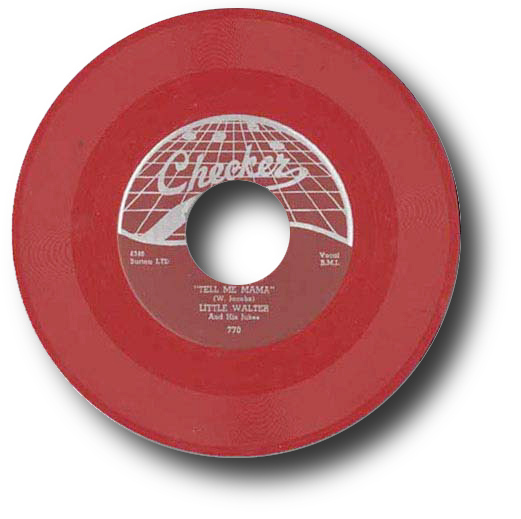
Chess producer, player, arranger, and all-around Mr. Fixit, Willie Dixon, first appears on "Don't Need No Horse" from January of 1953, a fine instrumental that bears strong similarities to "Tell Me Mama," which Walter actually lifted from Washboard Sam's catalog. Issued as Checker #770 (see image) from a March 1953 date, this session produced another soaring, non-vocal, "Off The Wall," its flip-side. Exemplifying how everyone locked in and played as smoothly as a fine watch; the Myers brothers distribute effortlessly swinging guitar lines, as Dixon's upright bass adds a foundation for the well-placed bombs Below continues to drop, and Little Walter is allowed complete freedom to expand the range of harmonica even more. "Fast Boogie" is a stellar harp shuffle with Walter furthering his already incredible range of tone; from the summer of 1953, the recording originally appeared on a vinyl bootleg series along with "Fast Large One," a relentless and grinding chromatic shuffle. It is tracks such as these that afforded other bands to enter a door opened by Walter and his cohorts; by using the sensibility of a small jazz combo, it was proof positive that coloring outside the lines was completely acceptable in blues, as long as soulful fundamentals were firmly in place and the ears were kept wide open for changes in dynamics.
The commercially acceptable "You're So Fine" was backed with another lowdown chromatic feature, "Lights Out," for Checker #786, with the Myers brothers playing sensitive and perfectly located fills. The swaggering "Oh Baby" finds Walter playing thick and smoldering blasts in front of the band but it is Below who drives the tune with an unbridled presence as Louis Myers and Robert Jr. Lockwood add gripping shuffle patterns on guitar. It would be these two formidable sidemen who would combine with a few others, Dave Myers included, in writing the book on how to correctly play rhythm guitar behind Chicago's finest harp stylists. Otis Spann would join in on piano for a session in May of 1954 that saw a drilling "I Got To Find My Baby," then Dave Myers and Lockwood collaborate for an alternate take of "Last Night" from a July date with more of Walter's definitive and distorted harp on "You Better Watch Yourself." "Roller Coaster," with its stumbling yet cohesive groove comes from early in 1955, this time a duo of guitarists, Luther Tucker and Bo Diddley join Lockwood in laying a foundation for Walter's swooping phrases, while Tucker and Lockwood returned in July of the same year, interlocking for the gritty "Little Girl." Also aboard disc one are a handful of other fully satisfying tracks, including "Blues With A Feeling," "Quarter To Twelve," "Mellow Down Easy," and the Willie Dixon-penned "My Babe," based on an old Gospel standard, "This Train."
Disc two leads off with Walter grinding it out on "I Hate To See You Go" from August of '55 and December provided two other memorable efforts heard here, the stop-time roll of "Boom, Boom Out Go The Lights" (titled Boom, Boom Out Goes The Light here), and the fast clip of "You Know It Ain't Right." July of 1956 offered the highly rewarding "Just A Feeling," and in June of 1957, Walter went in the alley on "Ah'w Baby" (a different take from the Boss Blues Harmonica/Chess Blues Masters LP's) and the contagious shuffle of "I've Had My Fun," a reworking of Jimmy Oden's "Goin' Down Slow."
Walter's band, and to a small extent, his voice, had taken on a sound that was a little rougher around the edges by the time they cut a tough "Confessin' The Blues," which stems from the first month of 1958. Luther Tucker was hanging in and Jimmy Lee Robinson joined him with both handling the distorted guitar duties, but even if some of the smoothness was disappearing, there was no denying that Jacobs could still play immaculately sharp and stabbing harp choruses, and the clearly audible yell as Walter launches a particularly searing break offers plenty of proof that the band took their business seriously. A visit to the studios in August of 1958 found his old boss, Muddy Waters, along with Tucker, plus Otis Spann's always exciting piano, loping bass by Willie Dixon, and George Hunter now providing the backbeats. This session also delivered Jacobs' version of a song claimed by both Jazz Gillum and Big Bill Broonzy, "Key To The Highway," which was released on a Checker single. "Walkin' On," an instrumental, sees its first US release, featuring Muddy's unmistakable slide efforts supporting Walter's still flashy harp excercises.
Session details point to a recording date January of 1959 for "You Gonna Be Sorry (Someday Baby)," although late 1958 has been given as another possibility, and Walter blows a rare, unamplified solo using his vocal microphone for the harp chorus. On this Big Maceo-written track, he sounds tentative, something that wasn't part of his previous sessions, and his voice was now evidently showing signs of wear and tear. Missing the overall looseness and rumbling attitude that pervaded much of his earlier work, here there seems to be an air of defeat in his vocals, and when he yells for the band to come to a stop after he forgets his place in what would have been the closing verse, they carry on finishing up without him. February of '59 found him on a more upbeat effort, the rollicking "Crazy Mixed Up World," a strong chromatic piece with Lockwood back among the band, Luther Tucker and George Hunter still aboard, aided by Fred Robinson's second guitar and Dixon's romping bass lines.
A few moments of comic relief break things up letting us hear Walter complain that "this mic is a bitch, Leonard!" The producer convinces him to try the microphone before condemning it by saying, "If you kill a man, then say you killed him." After the back and forth comments, Jacobs digs in for "Worried Life," sounding stronger than on his earlier attempt at a Big Maceo song. Otis Spann lays out some solid two-fisted piano for "Everything's Gonna Be Alright," this time with Billie Stepney behind the drums, and George Hunter returned to familiar turf for an August '59 date that served up "Blue And Lonesome," Little Walter seeming downcast again, a far cry from his youthful exuberance on "Back Track," a highly creative instrumental from only a month prior. December of 1960 found Fred Below back in the rhythm section for three cuts that included "As Long As I Have You," issued as another Checker single, but there's a looming quality to Walter's approach making it clear he wasn't quite as sharp as a few short years before. Bursts of true genius spring from "It's Too Late Brother" and "Just Your Fool," both earlier cuts, while a few from 1963, including "Up The Line" and "I Don't Play" show brief moments of sheer brilliance, but it now seemed apparent that he was swimming against a tide determined to carry him away.
Living a tough street life and ready to fight at the mention of a name, Little Walter's quick temper managed to land him in scrapes constantly, and due to his small stature, it's a safe bet he came out on the short end of the stick more often than not. Numerous players who sat in with him in the later years saw him steadily declining as time wore on, stating that as soon as a worthy replacement came forward, Jacobs would head out the door only to return at the end of the night in a less than sober manner, loudly demanding he be paid his money. Once a striking and handsome figure, by the mid-to-late 1960's his face was a permanently scarred mess from too many fights and he was spiraling further into an abyss of alcohol and drug use. Although accounts of his premature death vary greatly depending on the source, one thing was certain, he'd been on the bottom side of a scuffle one time too many. After being struck on the head in another street brawl, he died February 15, 1968, a few months shy of his 38th birthday.
It could be said that this set should have offered more of Walter's earlier material in exchange for some of the later attempts to recapture the consistency he was once easily capable of, but what The Essential Little Walter accomplishes, intended or not, is the dawning of one's brilliance, the central years of the most creative and influential harmonica player in blues, and the unfortunate demise of that genius at far too young an age. Don Snowden's detailed liner notes along with strong session information and superb photos from the Chess files make this a perfect introduction to one who was a key player in the development of Chicago Blues, and considering there won't be a boxed set in the forseeable future dedicated to him, with the incredible heights he reaches here, this two-disc set is essential.
Little Walter Jacobs is idolized today, decades after his death, just as much if not more, than any other blues figure and the reasons are many. He was in Chicago as a prime mover when the amplified style of the music would begin reverberating throughout the small taverns, plus he joined Muddy Waters and others for some of the most successful and powerful blues records ever. His fluency revolutionized how harmonica was played and Walter allowed his sense of freedom and vibrancy to turn a small instrument into a smoldering weapon. His full command and mastery of tonal subtleties, and his domination in a school that included countless gifted players have assured him prestigious placement at the top of the list of blues harp slingers. The roll-call of those indebted to him will forever remain an opened book that is added to each time a willing youngster hears his endless creativity and winds up in the ranks of the countless blues bands turning out dedicated renditions of his songs. Little Walter Jacobs might not have initiated the tradition of amplified harmonica playing, but there can be no doubt that he was the first to prove its uses were limited only by the distance one's imagination was willing to travel.
Special thanks to Alan Balfour for productive information.
References:
Blues Records 1943-1970 - Leadbitter and Slaven (Volume Two) - Record Information Services
All Music Guide to the Blues - Edited by Erlewine, Bogdanov, Woodstra, Koda (2nd Edition) - Miller Freeman
Special thanks to John Tefteller at: http://www.tefteller.com/html/l_walter.html - or - www.tefteller.com
for providing the image of: Checker #770 - A particularly rare and valuable red opaque 45 RPM pressing of Tell Me Mama
Simply click on the CD cover to order the CDs NOW!

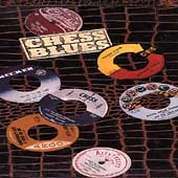
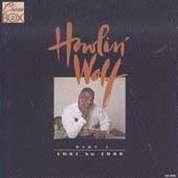
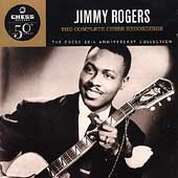 Next Installment - Building an Essential Blues Collection - Part Three: Jimmy Rogers
Next Installment - Building an Essential Blues Collection - Part Three: Jimmy Rogers
This review is copyright © 2002 by Craig Ruskey, and Blues On Stage at: www.mnblues.com, all rights reserved. Copy, duplication or download prohibited without written permission.
For permission to use this review please email Ray Stiles at: mnblues@aol.com

 Web Hosting & Design:
Web Hosting & Design:
Web Hosting & Design.
Most affordable web hosting and design services available.
Find out how you can host your current site at Blues On Stage, or how I can help you design your own website!
 If you would like your CD reviewed, please send TWO (2) copies, along with promotional material to:
If you would like your CD reviewed, please send TWO (2) copies, along with promotional material to:
Blues On Stage
PO Box 582983
Minneapolis, MN 55458-2983
E-mail Ray Stiles @ mnblues@aol.com with any questions.
